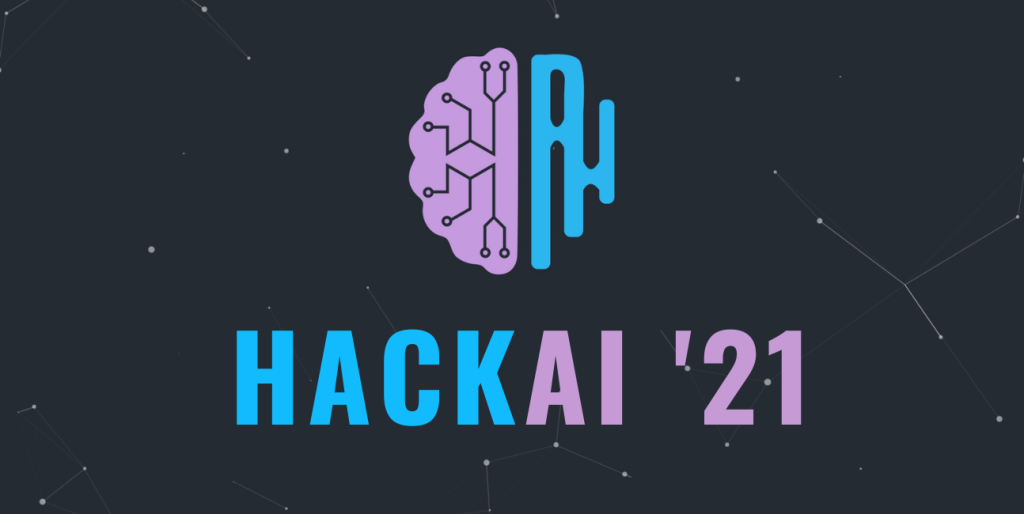HackAI’21 Goes Virtual For Its Third AI Focused Hackathon

Today, artificial intelligence is a buzzword that’s frequently mentioned. Still, many students are unaware of what it means, the subtopics within the field, and how they can get started and nurture their interests, especially beginners. The AI Society hopes to take the mystery out of this specialized niche in computer science and bring it forward to students through HackAI, a 24-hour hackathon dedicated to featuring AI-related material. The aim is for the hackathon to provide both learning and competition opportunities and connect them to professionals who can further guide them in their AI journey.
This March, AIS brought the third iteration of HackAI to students in a virtual setting and included several special guest speaker events and workshops, along with the challenges, to engage students. The AIS team noted, “What makes our hackathon unique this year is we’ve organized the event into tracks based on students’ prior experience with AI, allowing both beginners and students with advanced experience to learn and participate, and we plan to continue this format in future years”. HackAI ’21 saw a record 250+ applications from students of various majors within the Erik Jonsson School (ECS), Jindal School of Management (JSOM), and the School of Natural Sciences and Mathematics (NSM). Approximately 110 students attended, and a total of 18 projects were submitted. Prize money for this year’s awards totaled $1,600.
This year’s theme for HackAI revolved around the applications of AI within various industries and its social impact. The general challenge was for students to build an AI-based application that has the potential to bring significant positive change at a scale proportional to communities around the world. In contrast, company-specific challenges focused upon the use of AI in industries such as healthcare, environmental sustainability, and business. Fiscal sponsors for HackAI this year included the UT Dallas CS Department, UT Dallas Center for Applied AI & ML, and SignaPay-DeepRisk. The challenges were provided by OpenAI, DeepCognition, and SignaPay-DeepRisk.
The 2021 HackAI winners are as following:
Best Overall: Winner: Table 9 – COV-AI-D
This project gives a prediction of COVID Results based on data collection checked against user-given data. This project utilized Convolutional Neural Networks to determine whether the patient has COVID or not.
Best of Track III: Winner: Table 1 – Robot Pathfinding Software
The Robot Pathfinding Software is a user-friendly platform that gives the robot nurse the optimal path to the patient. The administrator simply draws out the layout of the hospital once, and the robot will find the path. If no path is found, it will notify the administrator through an email API for further information.
Best of Track II: Winner: Table 14 – Pedestrian Crash Preventer
This Haar image classifier is able to recognize a human from a simple video stream. This could be implemented in cars to apply driver warning systems or automatic breaking in order to prevent pedestrian motor vehicle accidents. Using OpenCV, the team was able to train a Haar classifier using thousands of images in order to detect a human’s location in a video stream. This was all done on a consumer desktop windows machine within the span of 24 hours. If you would like to attempt something similar for yourself, the University of Auckland has a great tutorial that can be found here.
Best of Track I: Winner: Table 3 – Medical bot
Medica bot is a discord bot that provides answers and definitions to patients’ medical queries. The medical bot takes a pre-made prompt and text from the user. It uses that information to send a request to the OpenAI’s API. From there, Medical Bot takes the AI’s response and sends that back in chat to the user.
Best of OpenAI: Winner: Table 6 – HospiAI
Challenge: Design a system that uses OpenAI’s API and AI techniques to help with hospital administration.
This project is a web application that allows patients to connect with their doctors and fill out information before their appointments. The application sends pertinent information from patient’s responses and sends them to doctors. This project utilized the OpenAI API in order to process and summarize the details of the patient’s response and sends it to the doctor.
Best of SignaPay-DeepRisk: Winner: Table 15 – The eDoctor
Challenge: Create an application/model that impacts or helps businesses.
This project is a web application that allows patients to connect with their doctors and fill out information before their appointments. The application sends pertinent information from patient’s responses and sends them to doctors. The project utilizes the OpenAI API in order to process & summarizes the details of the patient’s response and sends the information to the doctor.
HackAI featured a keynote speech from Dr. Vijay Saraswat, Global Head of AI R&D at Goldman Sachs. Several faculty members also helped support the event and acted as judges, including Dr. Gopal Gupta, Dr. Doug DeGroot, Professor Gordon Arnold, Dr. Karen Mazidi, Dr. Anurag Nagar, Dr. Chris Irwin Davis, Dr. Elmer Salazar, Dr. Feng Chen, Dr. Richard Min, Dr. Vincent Ng, and Dr. Kangkook Jee. AIS officer alumni also returned to help judge and mentor students throughout the event.
ABOUT THE UT DALLAS COMPUTER SCIENCE DEPARTMENT
The UT Dallas Computer Science program is one of the largest Computer Science departments in the United States with over 3,315 bachelors-degree students, more than 1,110 master’s students, 165 Ph.D. students, 52 tenure-track faculty members, and 44 full-time senior lecturers, as of Fall 2019. With the University of Texas at Dallas’ unique history of starting as a graduate institution first, the CS Department is built on a legacy of valuing innovative research and providing advanced training for software engineers and computer scientists.




